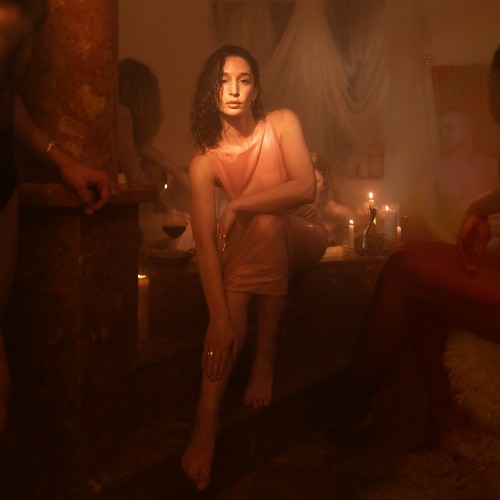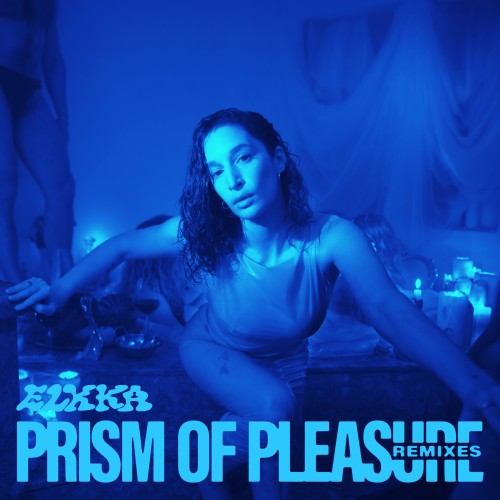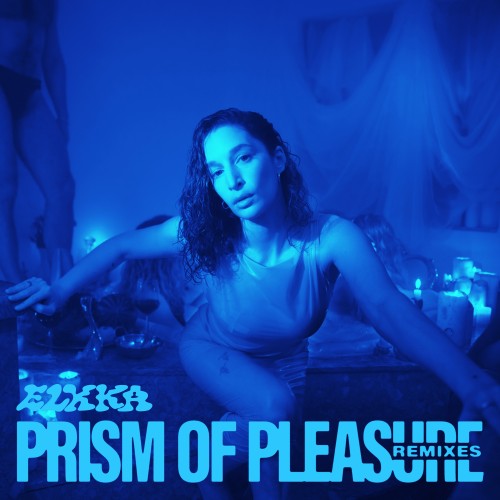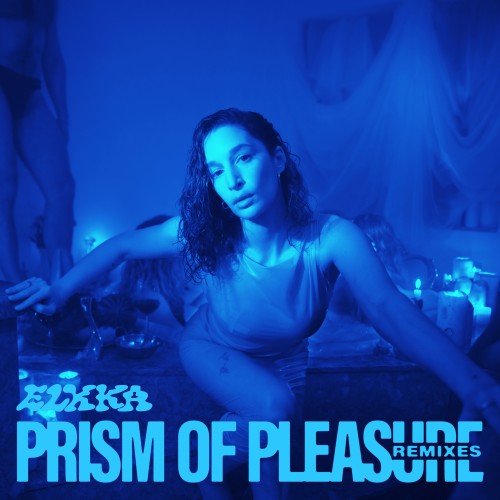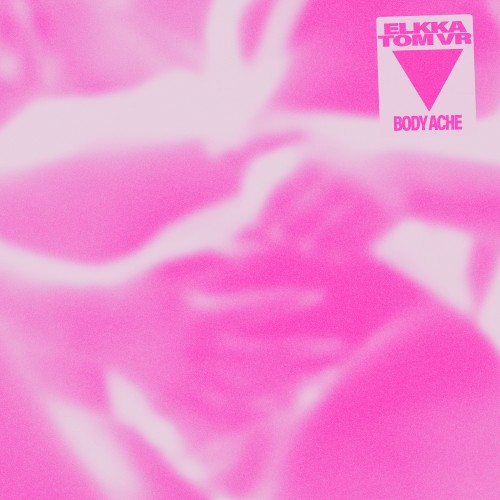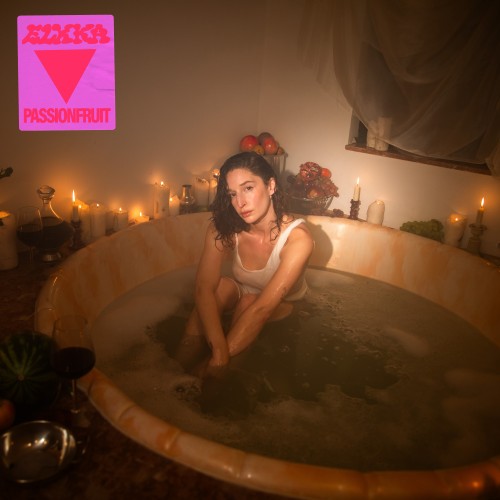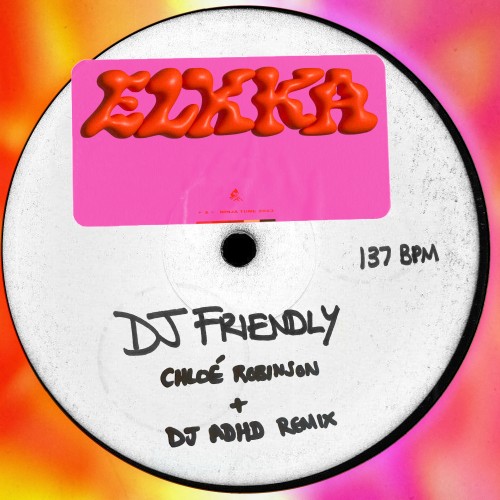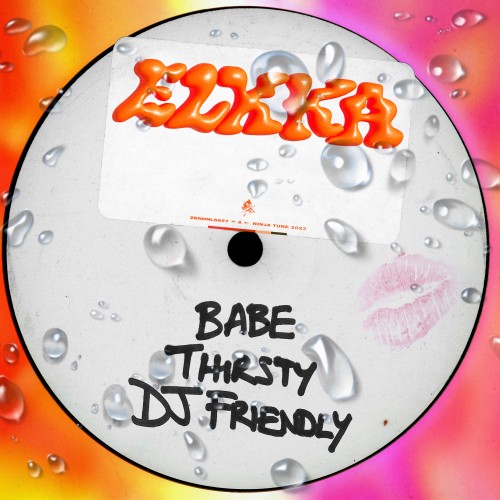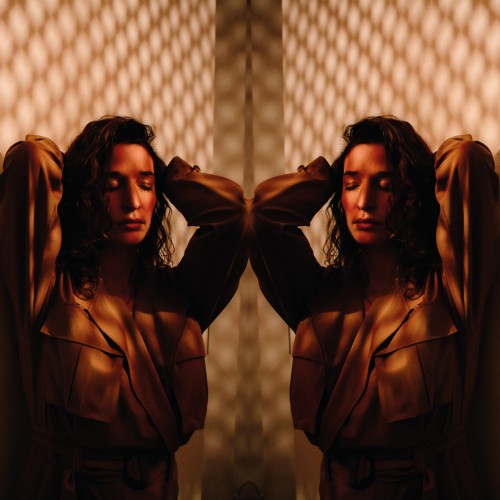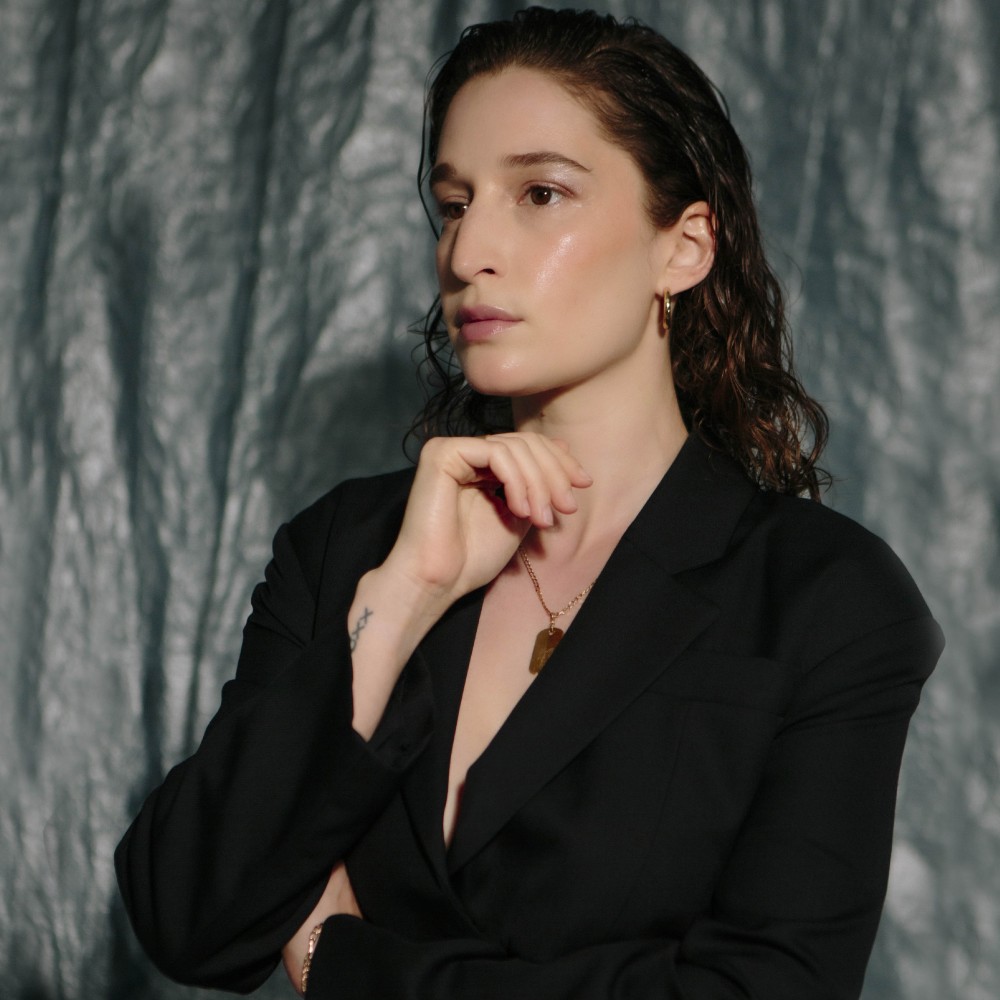
Elkka
On Ninja Tune
BIOGRAPHY
“Make me love you, make me love you, make me love you,” so begins “Make Me”, a delicious yet cavernous electronic dance track from London-based artist and producer Elkka; all heavy repetitive beats and glistening, syrupy vocal samples. Much of debut album Prism of Pleasure is like this: warmth and coldness rubbing against each other sonically, pulling the listener in unexpected directions throughout. “I like to go through different genres and moods and surprise y...
“Make me love you, make me love you, make me love you,” so begins “Make Me”, a delicious yet cavernous electronic dance track from London-based artist and producer Elkka; all heavy repetitive beats and glistening, syrupy vocal samples. Much of debut album Prism of Pleasure is like this: warmth and coldness rubbing against each other sonically, pulling the listener in unexpected directions throughout. “I like to go through different genres and moods and surprise you,” says Elkka. “‘Make Me’ has something about it that pushes and pulls you in two different directions, but still makes you feel safe.”
Prism of Pleasure is easily the most authentic expression of Elkka’s artistry to date. Written over the space of 18 months, the record encapsulates Elkka’s essence as a bold, queer woman who pushes freedom and sensuality to the forefront of her work. It hasn’t always been like this: born and raised in South Wales, with next to no queer community in her immediate vicinity, Elkka had to piece together her identity slowly and curiously, gradually finding herself along the way. After coming out and moving to London in her 20s, the musician started DJing, writing and producing, which eventually led to her launching her own record label, femme culture, and running her own queer club nights off the back of that. “I think sometimes things unlock, and start to make sense and then you just follow it,” Elkka says now. “I started to go out more and become part of a community. I was more confident in myself, so I was more confident in writing and producing – it all came together at the same time.”
Written around the notion of queer intimacy – with all of the power, vulnerability and connectedness that entails – Prism of Pleasure is like a peep into a steam-filled room of wonders, via the female gaze (a concept beautifully represented in the pink-tinged album artwork, photographed by Elkka’s wife and longtime creative collaborator Alex Lambert). From the smooth, silken vocals of “Crushhh” to the slow-winding, breathy beats of “Your Skin” (“I’m breathing you in, I want to taste every inch of your skin”) and the steady, undulating synth patterns of “surrender2me”, Prism of Pleasure unfurls like a patchwork of sweat-slick nights, emotional connectedness and hidden pleasures. “It’s like a celebration of [how far] I’ve come,” explains Elkka. “I was never taught about queer pleasure. I was never taught how important that is – not just sexually but generally in life. So I wanted to explore all of that more deeply.”
These themes aren’t new to Elkka, of course. On EP Everybody is Welcome (2019), she explored the idea of finding herself on the dancefloor among other queer bodies, themes which were further explored in 2021’s Euphoric Melodies (“which is about euphoria through dance music, connection with people and finding myself in those spaces”). On Prism of Pleasure, however, it’s as though all of those subjects are brought even further to the forefront, a sonic culmination of Elkka’s interests and desires.
Prism of Pleasure also sees Elkka explore the use of her own voice more (you can hear her vocals throughout, from “Break all my walls down” to “Crushhh”, “FCKD It”, “surrender2me” and “Your Skin”). After all, this is an album about empowerment and vulnerability, and opening up to others, so it made sense for her to incorporate her own singing into the mix. As a DJ and dance music aficionado, this is relatively new territory for Elkka, who has avoided leaning into that exposure in the past. “When I started to incorporate more vocals live, I was like fuck, this is a different level of connection with people,” she says. “At a recent show, my track ‘Break all my walls down’ was in the set, and I just sat on the floor and sang to people for two and a half minutes, and could just feel the difference in the room. I feel good about the fact that there’s more vocals than ever before. I’ll always make club bass music that will not have my voice on, but I’m glad that this album does. I want that from the artist that I love, so I wanted to give that.”
Elsewhere, on “Right Here”, a bittersweet, colour-coated dance track, Elkka dives into her most emotive and emotionally exposed state. Written in the space of 40 minutes on the day of her father’s funeral, it’s a song imbued with rawness and real feeling. “It’s difficult equating an album about pleasure with something I wrote when I was in a very different headspace,” she explains. “But I wrote it in a time of extreme vulnerability… It’s about needing and wanting someone to be there for you, even if you’re going to lose them.” The result is a bubbling fever-dream of a song; all yearning piano and lyrics about longing. “It was pouring out of me, and I was like, I’m just going to follow this through. I needed this, and it just came – it felt quite special and spiritual. I’ll never understand that.”
A record about connectedness would make little sense without some element of collaboration, and on Prism of Pleasure, Elkka enlists some of her favourite creative minds, from pianist John Carroll Kirby (Frank Ocean, Solange, Harry Styles) to Tim Bran (Scissor Sisters, Kylie Minogue), Ash Workman (Metronomy, Christine & The Queens) and UK producer Pearson Sound. “With this album, I was very focussed on exploring all of the areas that I was curious about, whether that be with collaborators or using my voice,” says Elkka. “I drew up a list of people I already felt connected to, as a listener… Sometimes you listen to something or read something and think ‘there’s a bit of me here, we share some brain waves, I get you’.” As a result, songs like “Passionfruit” – a musically succulent, exploratory nine-minute instrumental odyssey, made with Kirby – sound like non-verbal communication brought to life; an element only possible with others. “That song is about being able to take your time with someone, not being goal oriented and luxuriating in someone, says Elkka. “That’s what that song is for me.”
Elkka also engaged sex and sensuality expert Oli Lipski as a creative consultant on the project. The pair worked together to research pleasure in all of its forms – sensual, sexual, aural, deprived, creative, painful, political – forming the basis and lens through which Elkka approached the album. “With Oli it was just about exploring different themes and educating myself,” explains Elkka. “She linked me up to this orgasm library that exists, where people submit their orgasms and it tells you where they were and what they were thinking about. With creativity, these things often indirectly filter through to what you’re writing. I wanted to equip myself with more knowledge in order to open up my mind even more going into this, and to be able to talk about it more confidently… Even if nobody saw that work, it’s about informing and educating myself further.” The idea of pleasure shimmers throughout the album, both “directly and indirectly”. “There are songs about how I don’t know who I am,” Elkka continues, “and there are songs about being obsessed with somebody, and lust-love… All of this stuff.”
Ultimately, Prism of Pleasure is the result of Elkka opening herself up in new ways, and being as authentic as possible. “I wanted a rawness to this album,” she says. “It’s something that can be felt, and that helps you connect with someone that’s listening to it, if you’re willing to expose a part of yourself. And again, this is all really transferable to relationships, and being with someone, all of that stuff. and that’s why these things overlap for me. I gave everything I could, and hopefully that translates.”
Elkka
On Ninja Tune
Albums
Singles
Latest News
BIOGRAPHY
“Make me love you, make me love you, make me love you,” so begins “Make Me”, a delicious yet cavernous electronic dance track from London-based artist and producer Elkka; all heavy repetitive beats and glistening, syrupy vocal samples. Much of debut album Prism of Pleasure is like this: warmth and coldness rubbing against each other sonically, pulling the listener in unexpected directions throughout. “I like to go through different genres and moods and surprise you,” says Elkka. �...
“Make me love you, make me love you, make me love you,” so begins “Make Me”, a delicious yet cavernous electronic dance track from London-based artist and producer Elkka; all heavy repetitive beats and glistening, syrupy vocal samples. Much of debut album Prism of Pleasure is like this: warmth and coldness rubbing against each other sonically, pulling the listener in unexpected directions throughout. “I like to go through different genres and moods and surprise you,” says Elkka. “‘Make Me’ has something about it that pushes and pulls you in two different directions, but still makes you feel safe.”
Prism of Pleasure is easily the most authentic expression of Elkka’s artistry to date. Written over the space of 18 months, the record encapsulates Elkka’s essence as a bold, queer woman who pushes freedom and sensuality to the forefront of her work. It hasn’t always been like this: born and raised in South Wales, with next to no queer community in her immediate vicinity, Elkka had to piece together her identity slowly and curiously, gradually finding herself along the way. After coming out and moving to London in her 20s, the musician started DJing, writing and producing, which eventually led to her launching her own record label, femme culture, and running her own queer club nights off the back of that. “I think sometimes things unlock, and start to make sense and then you just follow it,” Elkka says now. “I started to go out more and become part of a community. I was more confident in myself, so I was more confident in writing and producing – it all came together at the same time.”
Written around the notion of queer intimacy – with all of the power, vulnerability and connectedness that entails – Prism of Pleasure is like a peep into a steam-filled room of wonders, via the female gaze (a concept beautifully represented in the pink-tinged album artwork, photographed by Elkka’s wife and longtime creative collaborator Alex Lambert). From the smooth, silken vocals of “Crushhh” to the slow-winding, breathy beats of “Your Skin” (“I’m breathing you in, I want to taste every inch of your skin”) and the steady, undulating synth patterns of “surrender2me”, Prism of Pleasure unfurls like a patchwork of sweat-slick nights, emotional connectedness and hidden pleasures. “It’s like a celebration of [how far] I’ve come,” explains Elkka. “I was never taught about queer pleasure. I was never taught how important that is – not just sexually but generally in life. So I wanted to explore all of that more deeply.”
These themes aren’t new to Elkka, of course. On EP Everybody is Welcome (2019), she explored the idea of finding herself on the dancefloor among other queer bodies, themes which were further explored in 2021’s Euphoric Melodies (“which is about euphoria through dance music, connection with people and finding myself in those spaces”). On Prism of Pleasure, however, it’s as though all of those subjects are brought even further to the forefront, a sonic culmination of Elkka’s interests and desires.
Prism of Pleasure also sees Elkka explore the use of her own voice more (you can hear her vocals throughout, from “Break all my walls down” to “Crushhh”, “FCKD It”, “surrender2me” and “Your Skin”). After all, this is an album about empowerment and vulnerability, and opening up to others, so it made sense for her to incorporate her own singing into the mix. As a DJ and dance music aficionado, this is relatively new territory for Elkka, who has avoided leaning into that exposure in the past. “When I started to incorporate more vocals live, I was like fuck, this is a different level of connection with people,” she says. “At a recent show, my track ‘Break all my walls down’ was in the set, and I just sat on the floor and sang to people for two and a half minutes, and could just feel the difference in the room. I feel good about the fact that there’s more vocals than ever before. I’ll always make club bass music that will not have my voice on, but I’m glad that this album does. I want that from the artist that I love, so I wanted to give that.”
Elsewhere, on “Right Here”, a bittersweet, colour-coated dance track, Elkka dives into her most emotive and emotionally exposed state. Written in the space of 40 minutes on the day of her father’s funeral, it’s a song imbued with rawness and real feeling. “It’s difficult equating an album about pleasure with something I wrote when I was in a very different headspace,” she explains. “But I wrote it in a time of extreme vulnerability… It’s about needing and wanting someone to be there for you, even if you’re going to lose them.” The result is a bubbling fever-dream of a song; all yearning piano and lyrics about longing. “It was pouring out of me, and I was like, I’m just going to follow this through. I needed this, and it just came – it felt quite special and spiritual. I’ll never understand that.”
A record about connectedness would make little sense without some element of collaboration, and on Prism of Pleasure, Elkka enlists some of her favourite creative minds, from pianist John Carroll Kirby (Frank Ocean, Solange, Harry Styles) to Tim Bran (Scissor Sisters, Kylie Minogue), Ash Workman (Metronomy, Christine & The Queens) and UK producer Pearson Sound. “With this album, I was very focussed on exploring all of the areas that I was curious about, whether that be with collaborators or using my voice,” says Elkka. “I drew up a list of people I already felt connected to, as a listener… Sometimes you listen to something or read something and think ‘there’s a bit of me here, we share some brain waves, I get you’.” As a result, songs like “Passionfruit” – a musically succulent, exploratory nine-minute instrumental odyssey, made with Kirby – sound like non-verbal communication brought to life; an element only possible with others. “That song is about being able to take your time with someone, not being goal oriented and luxuriating in someone, says Elkka. “That’s what that song is for me.”
Elkka also engaged sex and sensuality expert Oli Lipski as a creative consultant on the project. The pair worked together to research pleasure in all of its forms – sensual, sexual, aural, deprived, creative, painful, political – forming the basis and lens through which Elkka approached the album. “With Oli it was just about exploring different themes and educating myself,” explains Elkka. “She linked me up to this orgasm library that exists, where people submit their orgasms and it tells you where they were and what they were thinking about. With creativity, these things often indirectly filter through to what you’re writing. I wanted to equip myself with more knowledge in order to open up my mind even more going into this, and to be able to talk about it more confidently… Even if nobody saw that work, it’s about informing and educating myself further.” The idea of pleasure shimmers throughout the album, both “directly and indirectly”. “There are songs about how I don’t know who I am,” Elkka continues, “and there are songs about being obsessed with somebody, and lust-love… All of this stuff.”
Ultimately, Prism of Pleasure is the result of Elkka opening herself up in new ways, and being as authentic as possible. “I wanted a rawness to this album,” she says. “It’s something that can be felt, and that helps you connect with someone that’s listening to it, if you’re willing to expose a part of yourself. And again, this is all really transferable to relationships, and being with someone, all of that stuff. and that’s why these things overlap for me. I gave everything I could, and hopefully that translates.”

